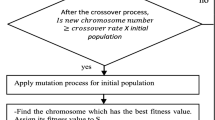Abstract
This paper addresses a no-wait multi-stage flexible flow shop problem. There are n jobs to complete in a predetermined due window; hence, some jobs may be rejected. A mixed integer linear programming model with the objective of maximizing the total profit gained from scheduled jobs is introduced. Since the problem is NP-hard and difficult to find an optimal solution in a reasonable computational time, an efficient genetic algorithm is presented as the solution procedure. A heuristic mechanism is proposed to use in each generation of the genetic algorithms to assure the feasibility and superior quality of the obtained solutions. Computational results show that the presented approach performs considerably in terms of both quality of solutions and required runtimes.
Similar content being viewed by others
References
Cetinkaya FC (2006) Unit sized transfer batch scheduling in an automated two-machine flow-line cell with one transport agent. Int J Adv Manuf Technol 29:178–183
Wang L, Zhang L, Zheng D-Z (2005) A class of hypothesis-test-based genetic algorithms for flow shop scheduling with stochastic processing time. Int J Adv Manuf Technol 25:1157–1163
Chen J-S (2006) A branch and bound procedure for the reentrant permutation flow-shop scheduling problem. Int J Adv Manuf Technol 29:1186–1193
Aldowaisan T, Allahverdi A (2004) A New heuristics for m-machine no-wait flowshop to minimize total completion time. Omega 32:345–352
Candar O (1999) Machine scheduling problems with blocking and no-wait in process. Department of Industrial Engineering, Research Report, Bilkunt University
Thonton HW, Hunsucker JL (2004) A new heuristic for minimal makespan in flow shops with multiple processors and no intermediate storage. Eur J Oper Res 152:96–114
Bertolissi E (2000) Heuristic algorithm for scheduling in the no-wait flow shop. J Mater Process Technol 107:459–465
Ruiz R, Allahverdi A (2007) No-wait flow shop with separate setup times to minimize maximum lateness.. Int J Adv Manuf Technol 35:551–565
Kalczynski PJ, Kamburowski J (2007) On no-wait and no-idle flow shops with makespan criterion. Eur J Oper Res 178:677–685
Pan Q-K, Tasgetiren M F, Liang Y-C (2008) A discrete particle swarm optimization algorithm for the no-wait flowshop scheduling problem. Computers and operations research doi:10.1016/j.cor.2006.12.030
Low C (2005) Simulated annealing heuristic for flow shop scheduling problem with unrelated parallel machines. Comput Oper Res 32:2013–2025
Oguz C, Zinder V, Do VH, Janiak A, Lichtenstein M (2004) Hybrid flow-shop scheduling problem with multi processor task system. Eur J Oper Res 152:115–131
Nowicki E, Smutnicki C (1998) The flow shop with parallel machines: a search approach. Eur J Oper Res 106:226–253
Sriskandarajah C (1993) Performance of scheduling algorithms for no-wait flow shop with parallel machines. Eur J Oper Res 70:365–378
Verma S, Dessouky M (1999) Multistage hybrid flow shop scheduling with identical jobs and uniform parallel machines. J Sched 2:135–150
Brah SA, Hunsucker JL (1991) Heuristics for scheduling in a flow shop with multiple processors. Eur J Oper Res 51:88–99
Hall NG, Sriskandarajah C (1996) A survey of machine scheduling problems with blocking and no-wait in process. Oper Res 44:510–525
Valente Jorge MS, Alves Rui AFS (2005) An exact approach to early /tardy scheduling with release dates. Comput Oper Res 32:2905–2917
Gabrel V (1995) Scheduling jobs within time windows on identical parallel machines: new model and algorithms. Eur J Oper Res 83:320–329
Garcia JMA (2002) Genetic algorithm for solving a production and delivery scheduling problem with time windows. In: Garijo FJ et al (ed) Advances in artificial intelligence. IBERAMIA, Springer-Verlag, Berlin Heidelberg, pp 371–380
Garcia JM, Lozano S (2005) Production and delivery scheduling problem with time windows. Comput Ind Eng 48:733–742
Lauff V, Werner F (2004) On the complexity and some properties of multi-stage scheduling problems with earliness and tardiness penalties. Comput Oper Res 31:317–345
Quadt D, Kuhn H (2007) A taxonomy of flexible flow line scheduling procedures. Eur J Oper Res 178:686–698
Grabowski J, Pempera J (2005) Some local search algorithms for no-wait flow-shop problem with makespan criterion. Comput Oper Res 32:2197–2212
Gen M, Chang R (1997) Genetic algorithms and engineering design. Wiley, New York
Kroon LG, Salomon M, Van Wassenhove LN (1995) Exact and approximation algorithms for the operational fixed interval scheduling problems. Eur J Oper Res 82:190–205
Torabi SA, Fatemi Ghomi SMT, Karimi B (2006) A hybrid genetic algorithm for the finite horizon economic lot and delivery scheduling in supply chains. Eur J Oper Res 173:173–189
Shiau D-F, Cheng S-C, Huang Y-M (2008) Proportionate flexible flow shop scheduling via a hybrid constructive genetic algorithm, Expert Systems with Applications: An Intel J 34:1133–1143
Wang H (2005) Flexible flow shop scheduling: optimum, heuristics and artificial intelligence solutions. Exp Syst 22:78–85
Kis T, Pesch E (2005) A review of exact solution methods for the non-preemptive multiprocessor flowshop problem. Eur J Oper Res 164:592–608
Jungwattanakit J, Reodecha M, Chaovalitwongse P, Werner F (2007) Algorithms for flexible flow shop problems with unrelated parallel machines, setup times, and dual criteria. Int J Adv Manuf Technol 37:354–370 doi:10.1007/s00170-007-0977-0
Jayamohan MS, Rajendran C (2000) A comparative analysis of two different approaches to scheduling in flexible flow shops. Prod Plan Control 11:572–580
Kaczmarczyk W, Sawik T, Schaller A, Tirpak TM (2004) Optimal versus heuristic scheduling of surface mount technology lines. Int J Prod Res 42:2083–2110
Author information
Authors and Affiliations
Corresponding author
Rights and permissions
About this article
Cite this article
Jolai, F., Sheikh, S., Rabbani, M. et al. A genetic algorithm for solving no-wait flexible flow lines with due window and job rejection. Int J Adv Manuf Technol 42, 523–532 (2009). https://doi.org/10.1007/s00170-008-1618-y
Received:
Accepted:
Published:
Issue Date:
DOI: https://doi.org/10.1007/s00170-008-1618-y




